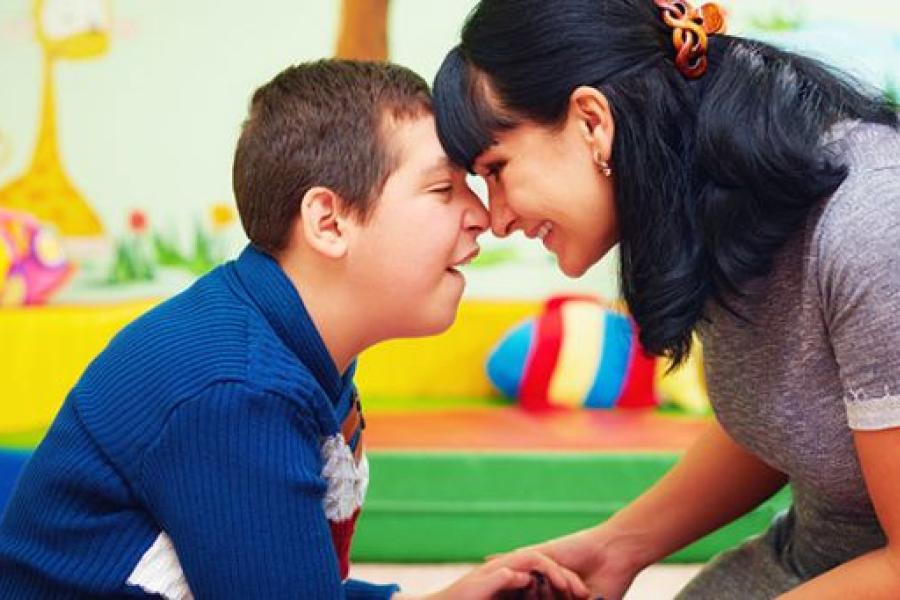COVID-19 reminds us that inclusivity is important
03 декабря 2020
- In observing the International Day of Persons with Disabilities we recognize that everyone has something to contribute.
In Uzbekistan and around the world, the International Day of Disabled Persons was observed on 3 December to promote the full and equal participation of persons with disabilities and to take action for the inclusion of persons with disabilities in all aspects of society and development.

In 2020 the special day took on heightened importance as the COVID-19 pandemic is disproportionately affecting people with disabilities. To address this challenge, the United Nations released a briefing report with recommended disability-inclusive response measures, calling for their special attention to this area as a vital part of achieving the pledge to leave no one behind, and a critical response to the global commitments of the Convention of the Rights of Persons with Disabilities (CRPD), the 2030 Agenda for Sustainable Development, the Agenda for Humanity and the United Nations Disability Inclusion Strategy.
UNDP Deputy Resident Representative Doina Munteanu said supporting efforts to empower and include persons with disabilities is much more than just doing the right thing for them. “Ensuring everyone is able to actively participate in the economy, public service and civil affairs is a good way to accelerate a county’s development trajectory,” she said. “When everyone is empowered to exercise their full potential as creative human beings with ideas and knowledge to overcome societal challenges, the entire country benefits.”
This spring, Uzbekistan’s TV viewers saw an unfamiliar sight: a daily news broadcast featuring simultaneous sign-language translation for the first time. UNDP partnered with UzReport TV to provide this service, enabling those with hearing impairments to receive the government’s regular COVID-19 briefings. Initially part of broader efforts to reach vulnerable communities in social groups or rural areas, this initiative has proved to be an enormous success, and looks set to remain long after the pandemic ends.
UNDP has launched several initiatives to support the Government with its targeted response measures during the pandemic. For example, sign-language translation is being used to help expand access to psychological support for those who may benefit from it. Together with UzReport TV, UNDP has provided sign-language translation once a week for its popular psychological counselling show with Aziza Tashkhajaeva. This show is also broadcast on the radio channels Mahalla and Oriat Dono for those with sight impairment. A UNDP-supported radio programme on Radio Maxima, the “One of us” series, strives to increase public awareness of disability issues.
To make sure everyone has access to the right information to protect themselves, UNDP has partnered with pharmacies, mahallas and homes for people with disabilities across the country to distribute braille pamphlets – for those with sight impairments – about the pandemic, and about gender-based violence. Another initiative involved a call for proposals from organizations working with disabled people. Eleven finalists received grants to launch and implement their small social initiatives.
Those with disabilities in Uzbekistan continue to face significant barriers in their daily life. To support them, more resources are needed in accessible formats like braille, audio, large prints or electronic books for education, access to public resources and employment opportunities. For this, the 2013 Marrakesh Treaty to Facilitate Access to Published Works for Persons Who Are Blind, Visually Impaired, or Otherwise Print Disabled is an important step. So far, 76 countries have ratified the treaty, and Uzbekistan is encouraged to join them.
Global evidence confirms that impacts of crises are never gender-neutral, and COVID-19 is no exception. While everyone is facing unprecedented challenges, women are bearing the brunt of the economic and social fallout of COVID-19. In particular, women who are poor and with disabilities face an even higher risk of COVID-19 transmission and fatalities, loss of livelihood, and increased violence. In this regard, UNDP is conducting a situational analysis on women with disabilities during the pandemic to correctly evaluate the needs and to address them with tailored solutions.
UNDP recognizes that current assessments of disability are based on the medical model, which looks at what is 'wrong' with the person, not what the person needs. This approach focuses on impairment and not empowerment. “We believe it is better to remove unnecessary barriers which prevent people with disabilities from fully participating in society, accessing work and living independently,” said Munteanu. “This all-of-society approach benefits everyone, as everyone has something unique to contribute.”
As part of this effort, a series of trainings were conducted for members of the Medical-Labour Expertise Commission (MLEC) this year to master a smooth transformation from the medical to social approach in assessing, defining and measuring disability.
The pandemic has reminded us how public infrastructure could better accommodate persons with disabilities. To fully evaluate the challenges and opportunities in this area, UNDP in Uzbekistan recently conducted an analysis and provided recommendations on accessible and affordable public services for persons with disabilities. It also is supporting efforts to further integrate women, men and children with disabilities into the civic process by generating greater public knowledge about the often invisible challenges affecting our neighbors, colleagues and loved ones with disabilities.




